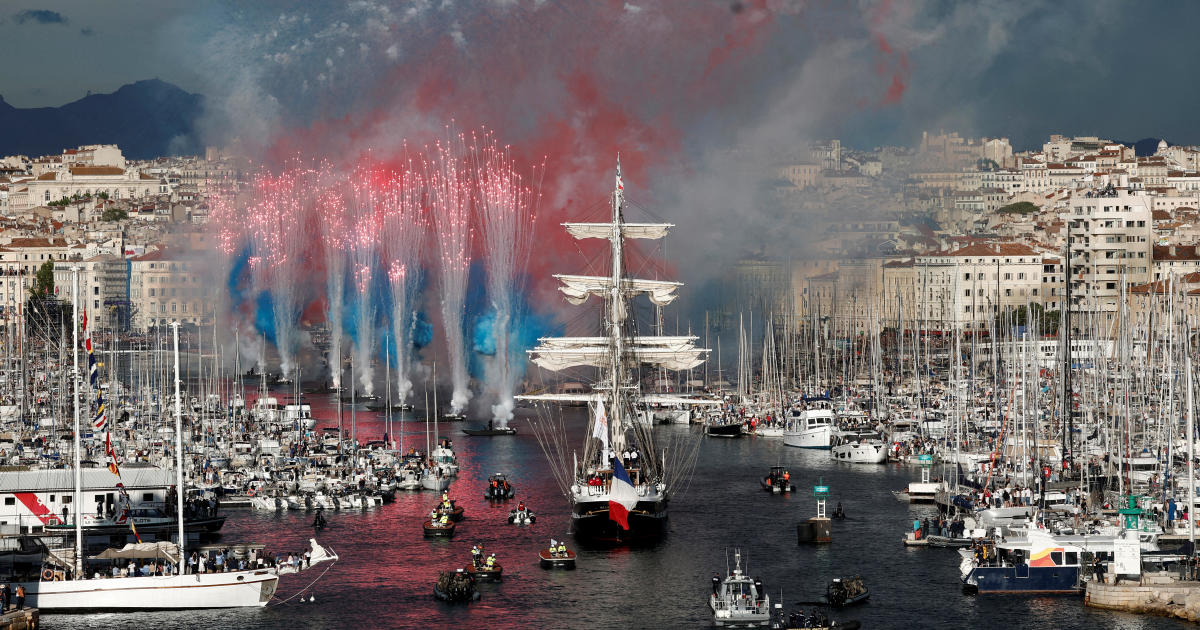Paris — Crowds started gathering early Wednesday morning around Marseille’s Old Port as a 19th century sailing ship carrying the Olympic flame appeared on the horizon. More than 1,000 boats accompanied the Belem, a three-mast schooner, as it approached the harbor of France’s second-largest city in a slow maritime parade on calm seas under a clear blue sky.
The flame was brought ashore Wednesday evening by four-time French Olympic medalist, swimmer Florent Manaudou. He passed the torch to Paralympian Nantenin Keita, who then gave it to French rap star Jul, who is from Marseille. He took it and lit the Olympic cauldron at the Old Port in front of an expected crowd of 150,000 people.
City officials said a billion more people were expected to watch the event live on television around the world — a first spectacle for fans less than three months before the 2024 Paris Summer Olympics kick off on July 26.
Reuters/Benoit Tessier
Several sports stars were expected to take part in the parade, including former NBA star Tony Parker and Ivory Coast soccer great Didier Drogba, as well as charity and entertainment figures. French President Emmanuel Macron was among those in Marseille to watch the arrival. Fireworks and a free open-air concert were set to continue into the night.
The flame was transported from Greece aboard the Belem. During the 12-day voyage, the flame was very much a part of everyday life on the historic vessel. The crew even brought it to the table during meals and guarded it carefully as rough weather whipped up wild waves.
The festivities continue in Marseille on Thursday, when the flame will begin a 68-day, 7,500-mile journey through France, taking in both the mainland and France’s overseas territories. Some 11,000 torchbearers will carry it through 65 French territories, stopping at more than 450 towns and cities along the way, as well as many iconic and historic sites.
From Marseille, it will be taken across southern France, including a crossing to the island of Corsica, before heading to southwest France, up the west coast to Normandy and then on to Brittany. From there, the flame will take to the seas again to visit Guadeloupe and Martinique. Another torch will be presented in the far-flung territories of French Guiana, Réunion and French Polynesia.
Ludovic Marin/Pool/AFP via Getty Images
On the mainland, the Olympic flame will visit Lascaux in the southwest, where ancient paintings cover cave walls; the medieval fortress of Carcassonne; Versailles Palace; Mont Saint-Michel; and the castles of the Loire Valley. It will travel through vineyards and visit some of the Olympic sites.
Throughout the journey, the Olympic torch relay, which kicked off in Greece last month, will highlight some of the major figures who inspired and contributed to French culture, from Joan of Arc to Charles de Gaulle and singer Edith Piaf.
The relay will end in Paris on July 26 for the opening ceremony on the River Seine — the first-ever Olympic curtain-raiser held outside of a stadium.
“It’s something we’ve been waiting for a very long time,” chief organizer Tony Estanguet said Monday, referring to the 100 years since Paris last staged the Summer Games. “The Games are coming home.”
France, which also hosted the 1900 Games, sees itself at the heart of the modern Olympic movement. It was a French aristocrat, Pierre de Coubertin, who revived the idea of the Games practiced by the Greeks until the 4th century B.C.
Wednesday’s highly choreographed ceremony is a first test for the French organizing committee, which has been hit by criticism over the cost of tickets and disruption to venue towns, especially Paris, where transport and other public works have blighted the landscape for the past two years.
Security is also a concern, and the Marseille event provided a first test for that, too. France is on its highest terror alert following revelations that the same ISIS affiliate suspected of attacking a Moscow concert hall in March had plans to also attack France.
Around 6,000 law enforcement personnel were on duty in Marseille for the arrival of the flame.
“It’s completely unprecedented for the national police to mobilize so many people on the same day at the same place,” regional police coordinator Cedric Esson told reporters ahead of the event.
Around 200 members of France’s security forces will accompany the flame throughout the relay. They will include an antiterrorism SWAT team and antidrone operatives.
The designers of the 2024 Olympic torch say it’s all about symbolism. It’s made of lightweight steel for purity, and it narrows at the top and bottom in a symmetry meant to reflect equality and parity.
The same torch will be used for the Olympic and Paralympic Games for the first time — reflecting efforts to build bridges between the two.




